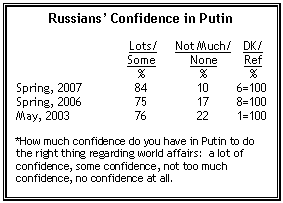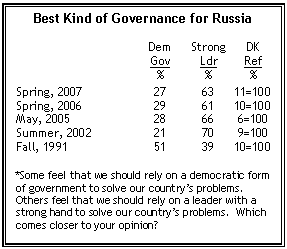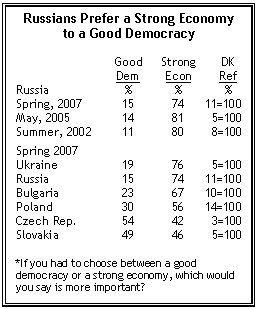by Erin Carriere-Kretschmer, Senior Researcher, and Kathleen Holzwart, Research Analyst, Pew Global Attitudes Project
On the eve of the 2008 Russian presidential election, opinion polling suggests the result of the election might be a foregone conclusion: Vladimir Putin’s handpicked successor, Dmitry Medvedev, is likely to become the next president of Russia.
Pew Global Attitudes Project survey data from 2007, along with other recent surveys, have found strong and consistent public support for Putin. And while the world at large may be concerned about Putin’s increased centralization of power and rolling-back of democratic rights, there is little indication that Russians share these concerns. In fact, surveys consistently find that Russians have a definite preference for a strong leader over a democratic government, and large majorities say that a strong economy is more important than a good democracy to solve Russia’s problems.
Putin’s Overwhelming Popularity

While initially an unknown in Russia when assuming office on Dec. 31,1999 following Boris Yeltsin’s resignation, Putin has since enjoyed the confidence and support of the Russian people. Pew’s results indicate that Putin’s appeal is near universal: More than eight-in-ten Russians’ have confidence in Putin to do the right thing regarding world affairs. Confidence in Putin cuts across all ages and income levels as well as both sexes and has been strong since 2003.
For most of his eight years as president, Putin has also maintained high approval ratings. With only weeks left in his presidency, this trend remains strong. Recent surveys conducted by the Yuri Levada Analytical Center show that more than eight-in-ten Russians say they approve of Putin’s handling of the post of president of Russia (Feb. 8-11, 85% approve, 13% disapprove; Jan. 18-22, 86% approve, 13% disapprove).
Recent results from a Yuri Levada survey also suggest that this nearly universal confidence in and approval of Putin may well transfer to Putin’s chosen successor Medvedev. Just before Putin announced his choice, only 35% of likely voters indicated that they would vote for Medvedev for president (December 7-10, 2007); shortly after Putin’s endorsement of Medvedev for president and Medvedev’s announcement that it was of “utmost importance” to have Putin as head of government, support for Medvedev jumped to 79%.1
It’s the Economy, Not Democracy, Stupid

Russia’s experience with democracy and a market economy has been much like a roller coaster ride — lots of momentum, highs and lows and sudden stops. Euphoria and hope followed in the wake of the collapse of the Soviet Union, along with real increases in the democratic freedoms allowed to citizens. Unfortunately these were soon accompanied by hyperinflation, high unemployment and, in 1998, the Russian financial crisis. The advent of Putin’s leadership in 1999 brought a rollback of democratic rights but also solid economic growth. Russians’ preference for a strong leader over a democratic government and a strong economy over a good democracy reflect both the political and economic uncertainty of the 1990s, and the substantial GDP growth the country has enjoyed during Putin’s presidency. Figure

In the immediate aftermath of the dissolution of the Soviet Union, half of Russians had faith in a democratic form of government to solve the country’s problems — a larger number than had faith in a strong leader (39%) to do the same. By 2002, the pattern had reversed to its current status with more Russians having faith in a strong leader than in a democratic government.
When Russians are asked which is more important to them, a good democracy or a strong economy, more than seven-in-ten choose a strong economy. Russians’ preference for a strong economy over a good democracy has remained widespread since 2002.
Russians’ preference for a strong economy over a good democracy in shared by others in Eastern Europe. However. this sentiment is more prominent in Russia and Ukraine than in Bulgaria, and far more so than among other east European publics surveyed.




